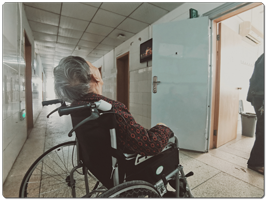If the people you have trusted to care for your parent or family member fail to uphold their duty, they must be held accountable, and our Pennsylvania nursing home abuse attorneys can help.
Every day, 1 in 43 nursing home residents contract at least one healthcare-associated infection, and as many as 1 in 10 aged Americans experience some form of abuse. Munley Law is dedicated to advocating for the elderly and ensuring that victims receive the maximum compensation possible.
Our award-winning personal injury attorneys will answer your questions, explain your rights, and advise you on the next steps to take. Backed by over six decades of experience in personal injury litigation, our firm has helped Pennsylvania families recover over $1 billion in settlements across a wide range of negligence cases. Our consultations are free, and we only get paid if we win your case, so you will never have to pay any upfront fees.
$32 Million Wrongful Death
$26 Million Truck Accident
$20 Million Commercial Vehicle Accident
$19.8 Million Truck Accident
$17.5 Million Car Accident
$12 Million Work Injury
$11 Million Truck Accident
$9 Million Truck Accident
$8 Million Truck Accident
$8 Million Truck Accident
$7.5 Million Auto Accident
$6.9 Million Garbage Truck Accident
How Often Does Elder Abuse Occur?
According to the National Council on Aging, one in ten Americans over the age of 60 has experienced some form of elder abuse. The true number of nursing home abuse cases that take place each year is difficult to pinpoint because it is estimated that only one in 24 cases is reported. Not all of these instances take place at a nursing home, but elder abuse and neglect at long-term elder care facilities are far too common.
How Common is Nursing Home Abuse in Pennsylvania?
Government oversight reveals widespread issues in Pennsylvania’s nursing homes. A 2022 federal investigation of just 20 facilities uncovered 586 violations, including life safety deficiencies and issues with infection control.
Pennsylvania state inspectors conduct hundreds of investigations monthly. In January 2022 alone, they completed 497 inspections across 340 nursing homes, with 390 of these being complaint investigations, where families or staff reported suspected problems. However, a 2023 report by the U.S. Senate Special Committee on Aging revealed that nearly one-third of nursing homes nationwide were behind on their required annual inspections, and roughly one in nine had gone two years or more without one.
The state regularly issues significant financial penalties for violations, reflecting ongoing patterns of substandard care throughout Pennsylvania’s long-term care system. U.S. nursing homes received nearly 95,000 health citations in 2023, highlighting how widespread compliance problems have become across the industry.
The Root Cause: Many facilities report staff turnover rates exceeding 50%, with some as high as 90%. This chronic understaffing crisis directly contributes to neglect and abuse, as overworked and under-trained staff struggle to provide adequate care. A 2024 report from the American Health Care Association found that 99% of nursing homes currently have open staff positions, and 72% are still operating below pre-pandemic workforce levels. Recruiting remains an uphill battle, with 94% of facilities struggling to find new hires and 67% citing a lack of qualified or interested candidates as a major barrier to maintaining safe standards of care.
What Are the Types of Nursing Home Abuse in Pennsylvania?
Elder abuse in Pennsylvania nursing homes takes several distinct forms, each with serious consequences for residents’ health and well-being:
Physical Abuse involves the use of force that causes bodily injury, pain, or impairment. This includes hitting, slapping, pushing, kicking, misuse of restraints, or any form of physical coercion.
Emotional or Psychological Abuse encompasses verbal and non-verbal actions that cause emotional distress. Examples include verbal assaults, insults, threats, intimidation, humiliation, isolation from friends or activities, and other forms of psychological torment.
Sexual Abuse involves any non-consensual sexual contact with a resident, ranging from unwanted touching to rape. Residents with cognitive impairments like dementia are particularly vulnerable to this form of abuse.
Financial Abuse or Exploitation occurs when caregivers illegally or improperly use a resident’s money, assets, or property. This can include stealing cash, forging signatures, coercing residents into signing financial documents, or misusing their financial accounts.
Neglect is the failure to provide basic necessities, including food, water, shelter, clothing, hygiene, and essential medical care. This can be intentional or result from inadequate staffing and resources.
Research from the National Center on Elder Abuse supports these findings. The NCEA reports that emotional or psychological abuse is the most common type of mistreatment, making up 33.4% of all reported cases in long-term care facilities. Physical abuse accounts for 14.15% of incidents, while financial exploitation represents 13.8%. Sexual abuse is the least reported category, making up about 2% of cases. These figures hig hlight how widespread mistreatment remains in elder care settings and why vigilance and accountability are so critical.
What Laws Protect Nursing Home Residents in Pennsylvania?
Both Pennsylvania and the U.S. have laws in place that are meant to protect nursing home residents from abuse. Pennsylvania nursing homes must adhere to the Nursing Home Reform Act (a part of the Omnibus Budget Reconciliation Act of 1987), which outlines the rights of their residents, including:
- The right to dignity, respect, and self-determination
- Freedom from physical and chemical restraints unless medically necessary
- The right to be free from abuse, neglect, and exploitation
- The right to voice grievances without retaliation
- The right to participate in care planning
Pennsylvania expands on these federal laws by guaranteeing nursing home residents the following rights:
- The right to manage personal finances or delegate this responsibility
- The right to privacy in communications and visits
- The right to retain and use personal possessions
- The right to share a room with a spouse when both are residents
- Protection of personal funds held by the facility
In addition to federal law, Pennsylvania has the Older Adults Protective Services Act (OAPSA). This law requires mandatory reporting of abuse, neglect, or exploitation of anyone over the age of 60.
Steps to Take if You Suspect Nursing Home Abuse in Pennsylvania
If you suspect nursing home neglect or abuse in Pennsylvania, take immediate steps to ensure the safety of the victim and to hold the perpetrators accountable. Here’s a guide on what to do:
Document Everything: Photograph injuries and unsafe conditions, secure medical records, and collect witness statements. Keep records of all communications with facility staff.
Report Suspected Abuse: Contact Pennsylvania’s Department of Aging Protective Services hotline for investigations. For emergencies or criminal acts, call 911 immediately. The state ombudsman program can also advocate for residents’ rights.
Get Medical Care: Ensure your loved one receives immediate medical attention for any injuries or health concerns. This also provides independent documentation of their condition.
Contact Legal Help: Call Munley Law for a free consultation to understand your legal options and rights.
How Can Munley Law’s Pennsylvania Nursing Home Abuse Lawyers Help?

Free Consultation and Case Evaluation
The lawyers offer an initial free consultation to discuss the circumstances of your case, providing an opportunity to understand the legal options available without any financial commitment. They evaluate any evidence you might already have and advise on the strength of your case. The team explains the legal process, what you can expect, and how to proceed with a claim for nursing home abuse.
Comprehensive Investigation of Suspected Abuse
Nursing home abuse attorneys will collect detailed evidence to support the claim, including medical records, eyewitness statements, and expert testimony. They work to identify all potential defendants, including individual caregivers, nursing home staff, and the facility itself.
The legal team will assess the type and extent of abuse or neglect, employing medical experts if necessary to provide insight into the injuries and their impact on the victim’s life.
Filing Legal Claims Against Negligent Nursing Homes and Staff
Legal Documentation: Lawyers will prepare and file all necessary documents to initiate a lawsuit against the responsible parties. They ensure that your claim is filed within Pennsylvania’s legal deadlines for nursing home abuse cases. Throughout the legal process, your lawyer acts as your advocate, ensuring your voice is heard and your interests are represented.
Seeking Compensation for Damages
Our legal team will accurately calculate the total damages, including medical expenses, rehabilitation costs, pain and suffering, and other related expenses. Nursing home abuse lawyers often negotiate with the opposing parties to reach a settlement that adequately compensates for the damages without the need for a trial.
Our experience and negotiating skills aim to secure the highest possible compensation for the victim and their family.
Representing Clients in Negotiations and Court Proceedings
The lawyers will handle all negotiations to reach a fair settlement before the case goes to trial. Suppose a satisfactory settlement cannot be reached. In that case, your legal team is prepared to represent you in court, presenting your case with compelling evidence and expert testimony to seek a favorable judgment. Throughout the entire process, from the initial consultation to the final resolution of your case, we provide continuous support, keeping you informed and involved at every step.
Why Families Trust Munley Law
Families across Pennsylvania turn to Munley Law because our results speak for themselves. We’ve secured more than $1 billion in settlements and verdicts for personal injury clients, standing beside families during some of the hardest moments of their lives. Our partners are among the most respected trial lawyers across the Keystone State and the nation, with all five named to Lawdragon’s 500 Leading Plaintiff Consumer Lawyers in America and the Top 100 Trial Lawyers in Pennsylvania by the National Trial Lawyers Association.
Three of our partners have been recognized as Lawyer of the Year by Best Lawyers, and Marion Munley has earned the distinction of being one of the Top 10 Super Lawyers in Pennsylvania. These achievements reflect the trust families place in us, built on compassion, experience, and a record of real results.
By leveraging their specialized knowledge and experience in Pennsylvania nursing home abuse cases, lawyers from Munley Law can provide comprehensive legal support, helping to alleviate the burden on victims and their families while pursuing justice and compensation for the harm suffered.
Pennsylvania Nursing Home Resources
Here are some resources to learn about nursing home regulations, reports, etc.
- The Elder Abuse Guide for Law Enforcement breaks down elder abuse laws and statutes by state.
- Recent reports on deficiencies, turnover rate, and more are available for ProPublica.
- Recent nursing home survey results, available by month, are provided by the Pennsylvania Department of Health.
- The Pennsylvania Department of Aging provides an online tool to locate your local Area Agency on Aging.
Pennsylvania Nursing Home Abuse FAQs
What Should I Consider When Hiring a Nursing Home Neglect Lawyer?
- Experience: Many personal injury attorneys handle several types of cases, so hiring a lawyer with expertise in nursing home abuse cases is essential. During your consultation, ask about the lawyer’s experience with similar cases.
- Track Record: Look at the settlements and verdicts of the lawyer. Do they have case studies or a list of verdicts for nursing home abuse?
- Available Resources: An extensive investigation will be needed, which includes reviewing medical records, speaking with experts, and interviewing staff.
- Communication: You want an attorney who can answer your questions promptly and will keep you up to date with your case.
How Do I Report Suspected Nursing Home Abuse?
If you suspect abuse or neglect at a nursing home in Pennsylvania, you can contact the Pennsylvania Department of Health Division of Nursing Care Facilities and file an official complaint.
If you believe your loved one may be in immediate danger, call 911.
To file a complaint:
- Call the Department of Aging’s 24-hour hotline at 1-800-490-8505 to report suspected abuse
- Call 1-800-254-5164 to report a concern about the safety or conditions of a nursing home
- Use the online complaint form
- email [email protected]
- Send mail to:
Division of Nursing Care Facilities Director
Pennsylvania Department of Health
Division of Nursing Care Facilities
625 Forster St., Room 526, Health and Welfare Building
Harrisburg, PA 17120-0701
fax 717-772-2163
Is Nursing Home Neglect a Crime?

Pennsylvania law, specifically under the Older Adults Protective Services Act (OAPSA), provides a framework for the protection of older adults (aged 60 and over) from abuse, neglect, exploitation, and abandonment.
Criminal neglect in the context of a nursing home involves situations where the care provided falls significantly below the standard required and results in harm or a risk of serious harm to the resident. It can include failure to provide basic needs such as food, water, medication, medical care, hygiene, and protection from health and safety hazards.
The penalties for individuals found guilty of neglecting nursing home residents can vary, depending on the severity of the neglect and the specific circumstances. It can range from misdemeanors for less severe neglect to felonies for severe neglect that results in serious injury or death.
What Federal Laws Protect Nursing Home Patients’ Rights?
The 1987 Nursing Home Reform Law, officially known as the Omnibus Budget Reconciliation Act of 1987 (OBRA-87), establishes the standards of care and rights for residents in nursing homes that accept Medicare and Medicaid. It outlines services that must be provided, mandates individual care plans, and specifies residents’ rights, including the right to be treated with dignity, privacy, communication, and the right to manage one’s affairs.
The law also states the requirements for sufficient staffing and the qualifications of nursing home staff. It mandates that a registered nurse (RN) must be on duty 24 hours daily in facilities with more than 120 beds.
Contact Munley Law for a Free Consultation
If your loved one has suffered abuse or neglect at a Pennsylvania nursing home facility, contact the experienced nursing home abuse attorneys at Munley Law for a free consultation today.










